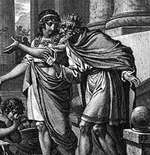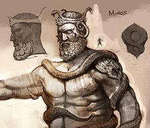
Aeacus
Aeacus was the king of the island of Aegina in Greek mythology. He was the son of Zeus and Aegina, daughter of the river god Asopus. Aegina was brought by Zeus to the island then called Oenone, in order to save her from her parents' wrath; the island later took after her name. Aeacus was born on the island, which was not inhabited at the time. So, Zeus transformed all the ants into men, forming the race of the Myrmidons (the word deriving from the Greek word for ant). Aeacus became the ruler of the Myrmidons. Another version has it that the island was inhabited; however, Hera, the jealous wife of Zeus, took the form of Aegina and sent a plague that drove away all of the inhabitants. That's when Zeus transformed the ants into humans.
Aeacus was considered a just and pious ruler, and was asked to judge over disputes of both men and gods all over Greece. The inhabitants of Aegina also believed that their ruler had created the cliffs that surrounded the island, in order to protect it from pirates. When Aeacus died, he went to the Underworld, where he became one of the three judges, the other two being Minos and Rhadamanthus.
See Also: Zeus, Asopus, Hera, Minos, Rhadamanthus
Aeacus Q&A
Aeacus Associations
Link/Cite Aeacus Page
Written by: The Editors of GreekMythology.com. GreekMythology.com editors write, review and revise subject areas in which they have extensive knowledge based on their working experience or advanced studies.
For MLA style citation use: GreekMythology.com, The Editors of Website. "Aeacus". GreekMythology.com Website, 10 Oct. 2015, https://www.greekmythology.com/Myths/Mortals/Aeacus/aeacus.html. Accessed 27 April 2024.





